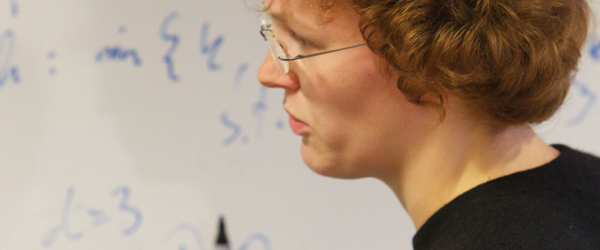Mathematics PGCE
This one year programme leads to a PGCE, recommendation for QTS and 60 credits at Master's level.
Programme overview
Recent years have seen many changes to the mathematics curriculum and we expect the next few years to be ones of embedding and consolidating new practices.
There is no one way to teach Mathematics. Schools use a variety of approaches and this programme will allow you to discover how best to use your talents to teach maths effectively.
What you will learn
Research and latest developments will drive your teacher education. We now understand more about how children learn mathematics and how different teaching methods are needed. You’ll develop mathematical skills through:
- discussion
- practical activity
- Problem-solving
- open-ended investigative work
- mental methods of calculation and algorithms
- the use of calculators and computers.
You’ll learn how to use all of these methods and how a focus of maths as a means of communication can help your pupils master the structures of mathematics.
How you will learn
You’ll work with your fellow student teachers and supporting each other you will learn by:
- working on issues of teaching and learning
- doing maths together
- developing and extending your knowledge of maths
- looking at activities for the classroom
- thinking about what pupils might experience
- sharing technical skills, such as computer equipment and packages.
Experiences in school
Introduction
There will be a short primary school experience during the PGCE year. This work allows you to understand the child's experience before they go into secondary school.
Placement one
During the first term, you begin with preliminary visits to a secondary school. These visits will help prepare you for a shorter placement in that school.
Placement two
In the spring term, you will be on placement in a different secondary school. This placement will last the duration of the spring term.
Placement three
You will have another placement in the third term, possibly in a different school again.
Benefits
You will benefit greatly from having your placements spread across different schools. They will provide you with the opportunity to:
- compare and contrast your experiences
- face different challenges and achieve different triumphs
- see different teaching styles
- learn how you can adapt to different situations.
By the end of your third teaching placement, you will have developed into a confident teacher with your own teaching style.
We will support you throughout your teaching experiences and you have a mentor in school. These specially trained teachers are committed to developing your practice in the classroom.
Who this is for
You will be studying with a group that ranges in ages, work experience, technological experience and mathematical experiences. This programme provides an exciting prospect for:
- graduates who have been successful in studying advanced and abstract maths
- individuals who have experience of applying mathematics in their career.
Contact us
Initial Teacher Education (PGCE and Lead Partner) Office
Phone: +44 (0) 117 455 9223 We are partly working remotely and recommend that you contact us by email in the first instance
Email: ed-pgce@bristol.ac.uk
School of Education
University of Bristol
35 Berkeley Square
Bristol, BS8 1JA
Funding
Find out about available funding to help you get into teaching.
Your tutors
The tutors for Mathematics are Dr Alf Coles, Dr Tracy Helliwell, Elliot Malkin and Rachel Helme.
